
In this January 12, 2010 episode of the Libertarian Tradition podcast series, part of the Mises Institute’s online media library, Jeff Riggenbach discusses the important role played by novelist and philosopher Ayn Rand in the early libertarian movement.
Editor’s Note: A transcript is unavailable. This early episode was never turned into a Mises Daily article most of the others.
Here is a brief summary, however:
In light of then recently released books on Ayn Rand — Jennifer Burns’s Goddess of the Market: Ayn Rand and the American Right and Anne C. Heller’s Ayn Rand and the World She Made — Riggenbach discusses Rand’s role in the early libertarian movement. Along the way he highlights Heller’s defense of the quality of Rand’s writing against mainstream literary critics. He goes on to argue that Heller’s book is the better of the two and explains what mars Burns’s book. He plays a couple of clips of Rand herself explaining why she and her philosophy of Objectivism are not conservative, and challenges the coherence of Burns’s conception of the American Right.
If you’re unfamiliar with Ayn Rand and her importance in the libertarian tradition, this episode offers a good primer on the subject as well as on what differentiates libertarianism and conservatism.
Help Promote Prometheus Unbound by Sharing this Post

In this January 6, 2010 episode of the Libertarian Tradition podcast series, part of the Mises Institute’s online media library, Jeff Riggenbach takes us on a biographical tour of the life of libertarian novelist and philosopher Ayn Rand.
Editor’s Note: A transcript is unavailable. This early episode was never turned into a Mises Daily article like most of the others.
Here is a brief summary, however:
In light of then recently released books on Ayn Rand — Jennifer Burns’s Goddess of the Market: Ayn Rand and the American Right and Anne C. Heller’s Ayn Rand and the World She Made — Riggenbach goes on to chronicle Rand’s early life in Soviet Russia, how she got out and immigrated to the United States, her work in Hollywood and her Broadway play, Night of January 16th, and her marriage to Frank O’Connor.
Riggenbach then covers the publication of her four major works of fiction: We the Living, Anthem (a novella), The Fountainhead (adapted to film with a screenplay by Rand), and her magnum opus, Atlas Shrugged. He also discusses Rand’s relationship with Nathaniel Branden, the formation of her inner circle, the publication of Rand’s nonfiction works, and the growth of the Objectivist community.
All that in 20 minutes! Phew!
If you’re unfamiliar with Ayn Rand and her work and life, this episode offers a good overview.
Help Promote Prometheus Unbound by Sharing this Post

In this episode of the Libertarian Tradition podcast series, part of the Mises Institute’s online media library, Jeff Riggenbach makes the case that the author of The Lord of the Rings, J.R.R. Tolkien, can be counted as a libertarian.
Editor’s Note: A transcript is unavailable. This early episode was never turned into a Mises Daily article like most of the others.
Here is a brief summary, however:
Riggenbach argues that The Lord of the Rings is “both an allegory of the inevitable fate that waits for all attempts to defeat evil power by power and an allegory of power exerted for domination.” The story is a dramatization of Lord Acton’s famous dictum that “power tends to corrupt, and absolute power corrupts absolutely.”
After a delving deeper into Lord Acton and his dictum, Riggenbach reads a couple of passages from one of Tolkien’s letters to his son, Christopher, that were also quoted by Alberto Mingardi and Carlo Stagnaro in their Mises Daily article, “Tolkien v. Power” (February 21, 2002). I quote the passages below for your convenience, but the whole article is well worth reading:
[continue reading…]
Help Promote Prometheus Unbound by Sharing this Post
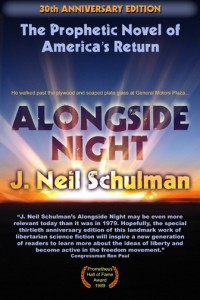

Alongside Night by J. Neil Schulman, so far as I am aware, is still the agorist novel par excellence. More than three decades have passed since its publication — not that you would know it without looking at the copyright date — yet in that time no other novel has so successfully mixed the principles of agorism with such a keen perspective on the future. There are not many novels that can top it for entertainment value either.
The story takes place in what was then the future, but which now seems a very prescient present. Not only is the story filled with theretofore unrealized gadgets and technology that differ from what we actually possess sometimes by no more than an appellation, or occasionally a small feature or manner of use, but the economic conditions described in the tale read like a seer’s forecast.
Schulman’s knowledge of economics allowed him to make a forecast every bit as accurate as the one for which Ayn Rand, in her novel Atlas Shrugged, has been lauded of late. In fact, this very knowledge of economics is probably what helped the author predict all those gadgets, for it is well established that science-fiction authors, a group not known for their economic acumen, tend to think on a grand scale when most of the advances, in a consumer-driven society, are modest devices of everyday convenience and entertainment.
It is a dystopian world we are plunged into in Alongside Night, where central control of the economy and erosion of civil liberties proceed, as they must, hand in hand. When the government abducts the protagonist’s father, a noted free-market libertarian economist somewhere between Milton Friedman and Ludwig von Mises in his radicalness, the high school student Elliot Vreeland embarks on a quest to free him. This quest takes him into the world of the agorists, free-market rebels and masters of counter-economics.
[continue reading…]
Help Promote Prometheus Unbound by Sharing this Post
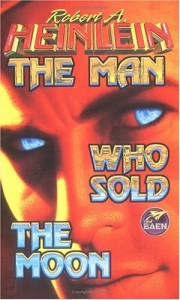
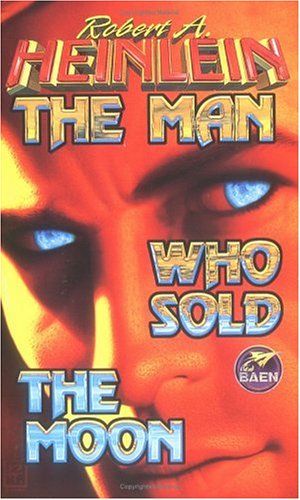
This month we are reading and discussing The Man Who Sold the Moon by Robert Heinlein:
This is not a novel but a collection of shorter fiction by Robert Heinlein that fall within his loose-knit Future History series. The title story, also the longest, is a novella about businessman D.D. Harriman’s dream of being the first to travel to and possess the moon, his schemes to raise capital in legitimate and semi-legitimate ways, and his efforts to avoid government ownership of the moon. The remaining short stories are “Life Line,” “Let There be Light,” “The Roads Must Roll,” “Blowups Happen,” and “Requiem.”
Moon only available on Amazon in mass market paperback, so order your copy soon. If you buy the book through our affiliate links you’ll be supporting our work here at Prometheus Unbound without costing yourself anything extra.
Join us as we read and discuss The Man Who Sold the Moon.
We’re reading the stories by internal chronological order rather than the order in which they appear in the book. I’ve written a post in the forum listing the stories in proper order and explaining why.
You need not have voted on this month’s selection to join in the discussion, but you do need to be registered and logged in on this site to access the book club’s dedicated forums.
October Recap
We’ve been reading J. Neil Schulman’s classic dystopian science fiction novel Alongside Night, winner of the Prometheus Hall of Fame Award and currently being adapted into a movie starring Kevin Sorbo (Hercules, Andromeda).
Official discussion is still open if you want to chime in before the live author chat with Schulman on November 10th. For more information on this event, see the Google+ event page. The discussion will be retired to the TLR — Previous Reads forum after the event, where discussion can continue without distracting from discussion of this month’s read.
[continue reading…]
Help Promote Prometheus Unbound by Sharing this Post

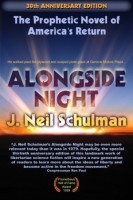
The date has been set for our live author chat with J. Neil Schulman, whose Prometheus Hall of Fame Award–winning novel Alongside Night is being adapted into a film starring Kevin Sorbo (Hercules, Andromeda).
The event will take place via Google+ Hangout on Air on Saturday, November 10th at 9PM EST (that’s 6PM PST / 8PM CST). It will be streamed live for those who cannot fit into the Hangout and a recording will be uploaded to our YouTube channel afterward. For more details, and to RSVP, visit the official event page on Google+.
Here are the official movie trailer, music video, and Schulman’s talk at Libertopia about bringing the book to film:
[continue reading…]
Help Promote Prometheus Unbound by Sharing this Post
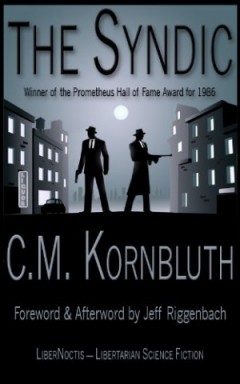
Get it for free in epub and mobi formats!
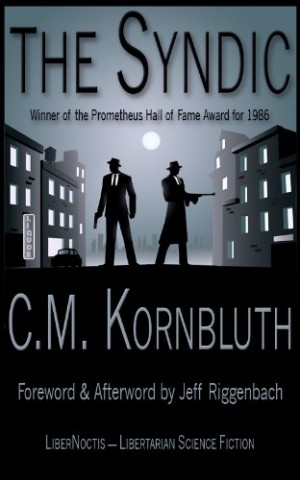
“What ifs” are the bread and butter of science fiction. What if organized crime overthrew the United States government and took over? What would life be like under the mafia? Would the people of North America be better off? These are the questions C.M. Kornbluth sought to answer in his science-fiction novel The Syndic (1953).
The Syndic is of interest to libertarians, not least because it was honored with the Prometheus Hall of Fame Award in 1986 by the Libertarian Futurist Society. This edition of the novel includes a forward and an afterward by Jeff Riggenbach that set the historical context for Kornbluth’s work and life and their relevance to libertarians. The Syndic is a fast-paced, entertaining tale replete with insights into the nature of the state and of war. Indeed, it could arguably be deemed an antiwar novel; but the insights do not end there.
As The Syndic opens, the continent of North America has long been divvied up between the Syndic and the Mob. The former United States government continues to exist in exile in Iceland and Ireland as the North American Government (NAG; an apt acronym). After an odd prologue composed of historical documents that set the stage for us, we’re introduced to our main viewpoint character, Charles Orsino, a low-ranking young bagman for the Syndic, who spends his days politely shaking down small businesses in the 101st New York Police Precinct for protection money and playing a brutal version of polo with jeeps and firearms instead of horses and mallets.
[continue reading…]
Help Promote Prometheus Unbound by Sharing this Post


















